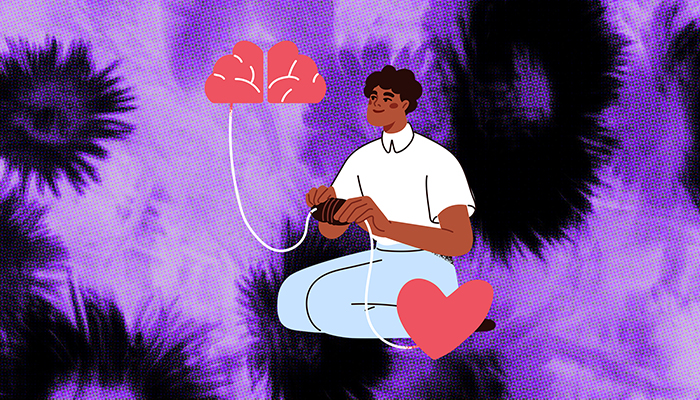This piece was written by guest contributor Serena.
It was 2014 when I was diagnosed with bipolar II disorder and general anxiety disorder. On top of my new diagnoses, I was feeling a growing sense of disconnect with my gender that I would later come to understand as gender dysphoria. At 21 years old, I didn’t have the language to understand my mental health, what it meant to have anxiety, and was among many who had a stigmatized idea of bipolar disorder.
I sat in my therapist’s office for what felt like hours. The signs were all there. I could admit to myself that something was wrong, but at that age, I didn’t want to face the stigma associated with mental illness. I simply got up, walked out of my therapist's office, and never saw her again.
I would be back again just a year later, and then once again in 2016 when I finally accepted I needed help. By this time I had understood the person I knew myself to be now, that I was transgender, and I was ready for growth.
Just seven years ago, we had little data on the mental health ramifications that come with being trans, largely imposed by a cisheteronormative society and its expectations that we fit into assigned gender roles. There was little in the way of research that I could look to for girls like me, and I found myself alone, making it up as I went on. However, in the years since, I’ve had the opportunity to meet many trans and gender-nonconforming people who have mental health issues and learn how they navigate them.
According to a report by The American Journal of Psychiatry, transgender and gender-nonconforming individuals are:
- Six times more likely to have a mood or anxiety disorder than the general population
- Three times as likely to be prescribed antidepressants and anti-anxiety medications; and
- More than six times as likely to attempt suicide resulting in hospitalization
However, general data on overall healthcare for my community is lacking. In GLAAD’s Media Reference Guide, 13 states don’t have any LGBTQ-specific healthcare centers, while LGBTQ people living in rural areas or within those 13 states have little to no access to LGBTQ-specific care at all.
As anti-trans legislators continue to rampage my community, I asked four trans and gender-nonconforming people of color about their mental health while navigating their transness, self-care techniques, and words of wisdom they’d like to share with those who still feel as if they’re walking in the dark.
“Cishet people can definitely do more, but it’s not the mental health barriers that need to be addressed,” Joelle tells me. “It’s the employment discrimination and barriers that continue to impact trans and gender nonconforming people.”
Joelle is the Director of Programming at The Normal Anomaly Initiative, a Houston, Texas-based organization that centers Black, queer plus persons to “overcome barriers, end stigma and problematic narratives to actualize a new normal.”

Joelle, a Black trans woman whose pronouns include “Hot Girl/City Girl/Icy Girl/Material Girl,” she jokes, has been a powerhouse with her activism and heavy involvement in Houston’s LGBTQ community. She has received nominations for her activism and work with organizations such as AIDS United, GLAAD, and the Gilead COMPASS Initiative.
“It’s the discrimination surrounding housing, it’s the anti-trans violence, it’s the stigmatizing language, and the lack of access to gender-affirming care,” Joelle continued. “Mental health challenges for trans and gender nonconforming people are often a symptom of another greater, systemic issue that plagues our community.”
This is a statement that Desi agrees with.
“Many of these obstacles across the board, including housing and job insecurity, or education, access to all of these things contribute to our overall mental health,” Desi said.
Desi is a Black trans woman based in Alabama and a theologian, consultant, and organizer who writes and speaks about race, religion, gender, Black church studies, diversity, equity, inclusion, sexuality, and how they all intersect. She also hosts the podcast Meditations with Desi.
Desi says that one of the main roads to access healthcare these days is through a job, and that our country needs to address “the need for health support by universal health care.”
She goes on to say that those in the LGBTQ community who are not trans or gender nonconforming can do more to help, “One of the ways that queer people can advocate for us is to push for us to be in spaces that will benefit us in securing better jobs and better housing, which will lead to improving our mental health.”
Dr. Jon, an award-winning non-binary educator and national speaker, also agrees that allies in the LGBTQ community can help address the mental health barriers for trans and gender-nonconforming people.
“I believe that cisgender queer people—and I say queer in the sense of the umbrella term, whether they be LGBT, or LGB, or Q or any other of the acronyms—I believe that if you have any type of privilege, you should be doing the work to advocate for those who are oftentimes overlooked and those who are often underserved.”
Dr. Jon says that, when trans and/or nonbinary people go to the hospital, they not only have to face health stigma in general but also have to navigate all of the other stigma that comes with being queer; including harassment, misgendering, or judgment and curiosity from healthcare professionals.
“There's something to be said about the ways that queer folks show up or don't show up for trans or nonbinary individuals, and how oftentimes we are left to our own demise when it comes to taking care of ourselves in a system that has historically never really cared about us or never really worked to our benefit.”
The systemic barriers to housing, employment, healthcare, education, and safety remain a consistent problem for Black and Brown trans and gender nonconforming people that contributes to physical health issues as well.
According to a statement from the American Heart Association, higher levels of heart disease found among trans and gender-nonconforming people were linked to gender-minority stress.
The statement titled Assessing and Addressing Cardiovascular Health in People Who Are Transgender and Gender Diverse found that more than half—56 percent of LGBTQ adults and 70 percent of those who are transgender, or gender non-conforming reported experiencing some form of discrimination from a health care professional:
“There is a need for additional training for clinicians and health care professionals to ensure gender diverse and transgender people feel safe and welcome in the health care setting. Training is also needed to make sure there is appropriate screening and management of cardiovascular issues and risk factors, particularly those associated with discrimination and stress, that are more prevalent in LGBTQ+ communities, such as smoking and excess alcohol consumption.”
Jasmine, a Black transgender woman who works with CrescentCare, a non-profit healthcare agency that provides medical and social services to the Greater New Orleans area, agrees that better training on gender diversity would aid in helping trans and gender nonconforming people.
“Trainings are also important, and the right people who are doing those training [too], [in order to] give that full life experience, most people who experienced that, you know, mental health issues — are the ones who we are more keen to help [do those trainings],” she adds.
_
Desi believes that those seeking therapy should consult with others in the community.
“Take your time, consult with community, and just be gentle with yourself. Be compassionate as you search. And if you end up with the wrong person, be compassionate, and heal from that, and try to search again or not,” she elaborates.
She continued, “The most important thing with people's therapy journey is that it has to be your own. You have to figure out what works for you and figure out what type of therapist won't be triggering for you, the type of person that you're most comfortable with, and even what types of therapy you're actually seeking, because there are so many different types.”
With one final thought, Desi believes we should invest in more than just self-care.
“We need to build and invest in communities of care; brave, safer spaces for trans and gender nonconforming people to exist, grow, and go through their journey. Our journeys are not siloed; we must take care of and embrace each other, and give each other grace. We are all managing our journeys the best we can, and are all seeking freedom to just be ourselves, and live and love as such.”
__
FOLX Health is the first digital healthcare company designed by and for the LGBTQIA+ community. Our services include virtual primary care, gender-affirming hormone therapy including estrogen and testosterone (HRT), mental health care, sexual and reproductive health care, preventive care, and fertility consultations. FOLX memberships give you access to LGBTQIA+ expert clinicians, peer support, thousands of LGBTQIA+ resources, and more. Whether you’re lesbian, gay, bisexual, transgender, queer, gender non-conforming, or nonbinary, you can find LGBTQIA+-specialized health care that helps you meet your wellness goals. FOLX Health is health care that's queer all year. Get all the benefits of becoming a FOLX member and sign up today!



